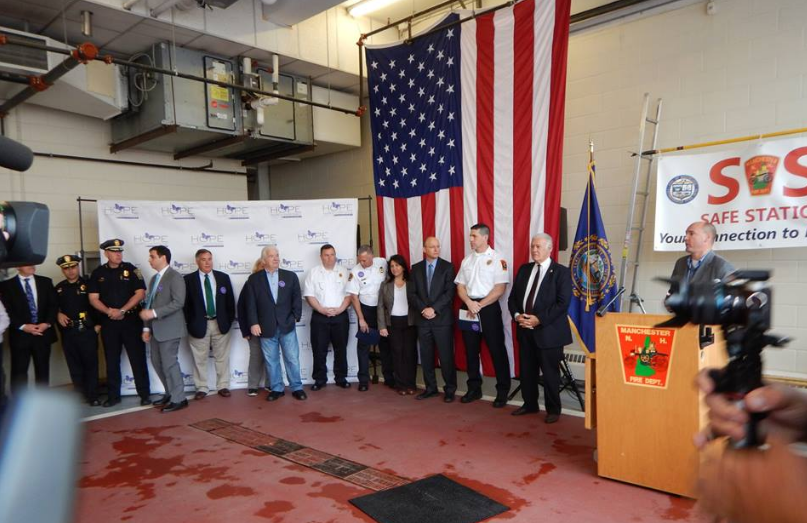
MANCHESTER, NH — Recognizing the need to increase access and promote awareness to recovery and addiction treatment options, leaders from across the city and the state today announced two new initiatives that will offer aid and assistance to those suffering from substance abuse and addiction within the city. The City of Manchester announced a groundbreaking “Safe Station” initiative and an expansion of the Granite United Way’s 2-1-1NH service. Both initiatives will connect drug/substance users with treatment and recovery services.
The Manchester Fire Department in conjunction with Mayor Ted Gatsas and the Board of Aldermen, Catholic Medical Center, American Medical Response (AMR) and Hope for New Hampshire Recovery announced the implementation of “Safe Station”. Safe Station is a starting point for drug/substance users who may not know where to begin the treatment and recovery process.
“As we have progressed through this epidemic I am continually amazed by the dedication and compassion of our first responders and emergency medical providers in the city,” said Mayor Ted Gatsas.
“They are on the front lines, working tirelessly to save the lives of those battling the cycle of addiction. The Safe Station concept started within our very own emergency responder community and is a new approach for a starting point to recovery. The expansion of 2-1-1NH will also provide us with a 24-hour pipeline to connect drug/substance users with Hope for NH Recovery. Both options are providing connections to recovery and with every connection we can prevent an overdose and save a life.”
2-1-1NH is an initiative of Granite United Way. This unique initiative is the collaborative effort of non-profits, state, corporate and volunteer partners, New Hampshire citizens to implement one, easy to remember phone number to call to access all the health and human services available across New Hampshire.
Safe Station will utilize the ten 24/7/365 fire houses throughout the city and will serve as a designated safe environment for individuals seeking assistance.
“Our mission at MFD is to provide an integrated emergency response to any situation that threatens the life, safety and the well-being of an individual,” explained Manchester Fire Chief Dan Goonan. “We treat this epidemic as we would any emergency that threatens the life of someone within our city. Chris Hickey our Emergency Services Officer has made it his mission within the city, to heighten public awareness and I am proud to support this initiative.”
“As we worked to develop Safe Station we immediately recognized the need for a connection between the desire to begin the recovery process and getting to a place where you could start that process,” said Chris Hickey, City of Manchester EMS Officer. “Many people just don’t know where to begin. Safe Station is that connection. The way it will work is an individual seeking assistance will go to a Manchester fire house. On-duty personnel will provide one-on-one interaction to obtain vital signs, and at that point, make contact with recovery services utilizing the designation within Manchester Fire Alarm “Code Hope.” Fire personnel will remain with the individual until they are transferred to AMR, if necessary, or connect with the recovery service representative.”
Additionally, beginning today, Granite United Way will begin a 24-hour hotline through the existing 2-1-1NH. Individuals requesting substance abuse assistance will be connected to a live recovery coach at Hope for NH Recovery, who will work with them to get them immediate services and programming on the track to recovery.
“We see our role at the United Way to serve those in need and certainly there is a need in the community,” explained Patrick Tufts, President and CEO of Granite United Way. “We are honored to be able to provide this critical connection by utilizing, and expanding, our existing 2-1-1NH service and we all recognize that the only way to save lives is by working together and sharing our resources.”
Granite United Way is an organization dedicated to leveraging the resources of investors and volunteers to create lasting change by addressing the underlying causes of New Hampshire’s most pressing needs and by supporting programs in the areas of education, income and health. Granite United Way works with more than 1,000 companies, 25,000 investors and thousands of volunteers every year to make local communities a better place.
Through Manchester’s Safe Station and the expansion of the Granite United Way’s 2-1-1NH service, those seeking treatment will be connected with Hope for NH Recovery. Melissa Crews, Past-chair of Hope for NH Recovery believes both of these initiatives fit well within the citywide mission to offer recovery resources. “At Hope, we recognize that treatment may not always begin within the recovery community,” said Crews. “All it takes to get to us is one connection. We are extremely grateful for these new connections and really believe they will be a tremendous resource to us as we expand recovery and treatment availability and awareness here in the city and across the state.”
“The death toll speaks for itself, and I have said repeatedly that we cannot arrest our way out of this problem, so I whole-heartedly support this unique approach to saving lives,” added Manchester Police Chief Nick Willard. “My officers are doing all they can to stem the tide of illegal drugs in our city and we are making progress, but we must also serve those who are fighting addiction.”
“Many forces have joined together to bring forward Safe Station and the expansion of 2-1-1NH. This response is uniquely Manchester. For a long time, here in the Queen City, we have been addressing this epidemic, we have talked about it, we have asked for help and we have refused to let it define us. We continue to work toward a solution and today I believe that we have put forward a model that will improve our community, that can make a difference and can be a model for cities and towns across our state and the country,” concluded Gatsas.







